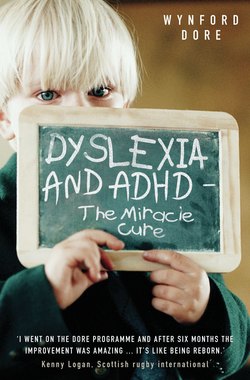Читать книгу Dyslexia and ADHD - The Miracle Cure - Wynford Dore - Страница 6
На сайте Литреса книга снята с продажи.
INTRODUCTION
ОглавлениеA Miracle Cure? was the title of a major documentary programme produced in the UK and shown on ITV’s Tonight with Trevor McDonald. The programme took an unprecedented, detailed look at the work Dore Achievement Centre had done in tackling learning difficulties. It triggered record-breaking interest in two different and surprising ways.
First, there were hundreds of thousands of attempts to phone our offices, made by people whose lives were being blighted by the symptoms they had witnessed during the documentary. These included poor reading skills, poor writing ability, poor concentration and often a low self-esteem. Some had even been called stupid or lazy, which is particularly cruel as we have now discovered that usually these folk are potentially brighter and are working harder than others. They had watched the show and marvelled as people with these problems had been transformed, and they wanted to find out how they could have this groundbreaking treatment themselves.
Most of them had not had those symptoms diagnosed, although some had been labelled as suffering from ADHD (Attention Deficit Hyperactivity Disorder), dyslexia, dyspraxia or, in a few cases, Asperger’s Syndrome. As a consequence of that television programme, many of those people have now had their lives totally transformed.
The second response to the documentary was from the learning difficulties industry offended by the documentary maker’s claims of ‘a revolutionary breakthrough’ in the treatment of dyslexia and the possibility of a cure. When used, cure is a word that seems to cause great offence to many professionals and for this reason we have always chosen to avoid using it. But the fact is the drug-free exercise-based programme we have developed is now delivering amazing results, and research says that the results seem permanent – the question is as to how best those results are described. Is ‘cure’ the best word to use?
Families that have to live with the symptoms of learning difficulties every day would love to have a solution for them, but up until now they may not have been aware that one may exist. Why is that? Well, most of those with symptoms of learning difficulties are brighter than average – behind that mask of symptoms that is. But, because the underlying cause of these problems has been misunderstood, virtually all treatments or programmes developed to deal with them up until now have had only mediocre impact. Thus, our life-changing programme presented quite a threat to that industry.
The fact is we are not a threat. There are two aspects to the process of learning – the first is a physiological one; the brain must have the ability to learn – that is what we work on. The other aspect is the process of ‘teaching’, and of course that is what teachers (and parents) do every day. For learning to be possible, both are needed. So, what we are doing is repairing the hole in the bucket; teaching is filling that bucket.
I am writing this at a time when it has just been announced in the US that many prescription drugs provided to treat ADHD sufferers must now have a black box on their label, warning of potential harmful side-effects. So it will be a great relief to families to know that the effectiveness of this exercise programme on ADHD is quite remarkable. Research has shown it to have twice the effectiveness of drugs, with no side-effects and when it is complete – typically after a year – it is permanent. How much better to spend five minutes twice a day for a few months to have a long-term solution not just to attention and hyperactivity issues but to unlocking the patient’s underlying potential, too. There’s no contest!
Of course, sadly, there are some who have very complex needs that the methods described in this book can’t always help. However, a startling one in six of the population is hampered by conditions we believe can be helped, and with the size of the problem it will ultimately require the resources of governments so that it reaches everyone who needs it.
But how long will this take? And will those with vested interests make sure its impact will be held up with the consequence that another generation will needlessly suffer? Will this paradigm shift take as long to be brought into use as penicillin did, for example, before it is accepted? And was Trevor McDonald’s right to raise the suggestion that this might, in time, lead to a cure?
The fact is, the results are amazing and, while what we share with you is still a theory, the science behind the outcomes is increasingly well understood. The need, too, is a desperate one and personally I care less about which word is used. Instead, I will focus all my energies on getting this wonderful hope and help to those who need it, fast.
